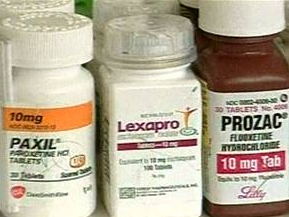Treatment of depression with antidepressants, efficiency and disadvantages
Treatment of depression with antidepressants
Antidepressants have a peculiar place in the public mind. Almost every family in the UK will have someone taking these drugs ; yet , the media are often very hostile to them with disparaging te rms such as “happy pills” (ANTIDEPRESSANTS)used to cast aspersions on their efficacy and utility ( Nutt 2003a ) . Mor eover , claims that they may cause suicidal ideation particularly in young people have lead to warning labels in the USA. Yet , despite the repeated media criticism , the use of antidepressants continues to be wid espread. S o what are the reasons for this? The first is that they are effective and the disorders they are used to treat are very common.Depression is predicted to be largest cause of d isability in the world by 2020 ( Murray and Lopez 1997) and is now exceeding that of cardiovascular disease in many western countries (ma king it number one there already) . Moreover , several of the anxiety disorders are also in the top ten causes of disability , and these also respond very well to antidepressant treatment. In their primary target of depression , the antidepressants are effective treatments of the acute phase with a number needed to treat (NNT) of about 6 , which compares favourably with treatments in other branches of medicin e. However , when used in the long term to prevent recurrence of depression , they become even more effective with an NNT of 3 (Geddes et al 2003).
This makes them one of the most effective of any medicine: for comparison the NNT of statins to prevent the re currence of a myocardial infarction is about 20. Similar efficacy is seen in their secondary indications of the treatment of anxiety disorders. Moreover , the desire of many countries to reduce the prescribing of benzodiazepines has lead to a switch to the new antidepressants , particularly the selective serotonin reuptake inhibitors (SSRIs) that have greater efficacy and are much freer from problems such as abuse and withdrawal ( Nutt 2003b ) . Although the SSRIs take several weeks to work and can even worsen anxiety at the start of treatment after a few weeks , they become very effective anxiolytic treatments with efficacy exceedi ng that of the benzodiazepines . The SSRIs also have uses in other indications such as pain, some sleep disorders and some sexual problems (particularly SSRIs for premature ejaculation).
There are other factors underlying this increase in use. The most important one is that the newer an tidepressants are extremely safe drugs. Before their invention , the most commonly used antidepressants were those of tricyclic structure such a s amitriptyline and duselepin.
However , these are very toxic in overdose due to their combination of noradrenaline reuptake blocking properties and marked anticholinergic actions on the heart. At the peak of their use , they were the most common cause of drug overdose death in the UK, and still today kill hundr eds of people a year (Nutt 2005) . Patients with depression are at very high risk of suicide , and before the onset of the SSRIs , many used their antidepressants to kill themselves.
Details here
Labels: antidepressants, depression, happy, pills







